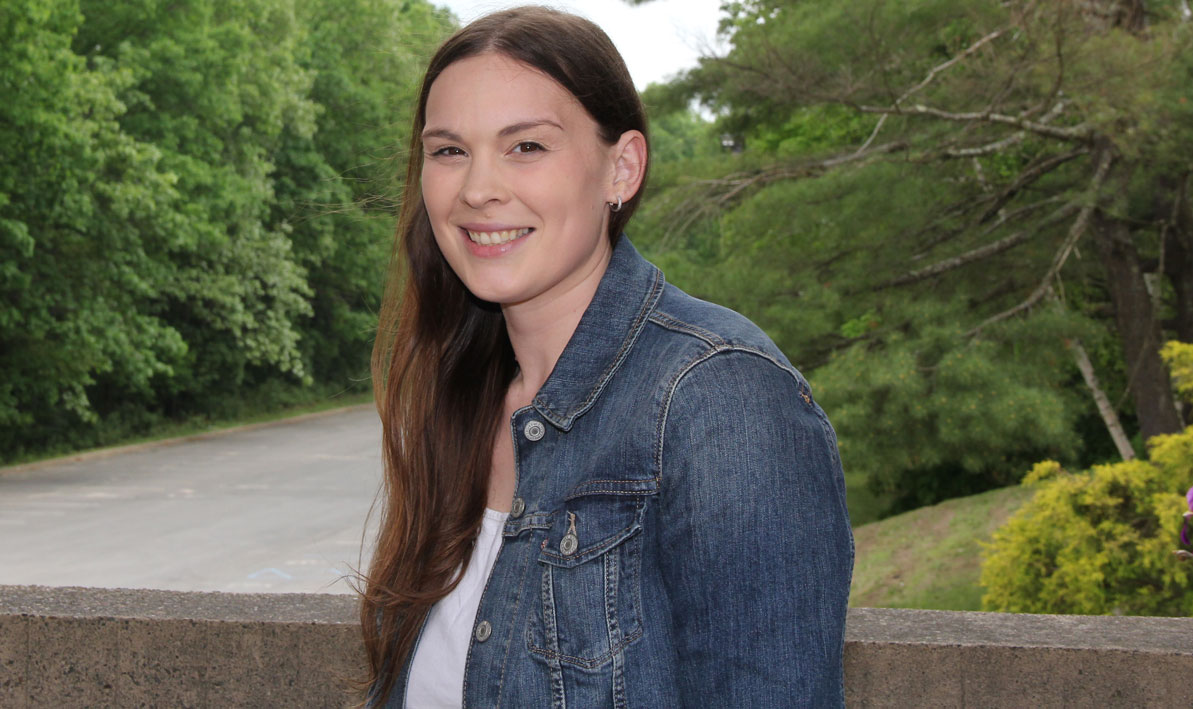STEM Redemption
"HCC was completely different than the other educational experiences I have had. I felt supported, encouraged. I got great advice. There are teams of people here that try to help you and want to see you succeed, and it's genuine. They're at a community college to serve the community."

The first time she tried college, Savana Paciulli decided to ease into it. She signed up for just two classes her first semester, and those were in her favorite subjects, math and photography.
"I thought if I did that there was no way I was gonna mess it up," she said.
As a child, Paciulli had been diagnosed with dyslexia, ADHD, and other conditions she rejected in an attempt to fit in with her peers. School had always been a struggle. In college, anxiety got the better of her.
"It was so bad I used to drive all the way to campus and just sit there," she said. "I couldn't get out of my car."
She ended up dropping both classes.
"I was stubborn and unwilling to admit that I needed accommodations," said Paciulli. "I was completely unsuccessful. It was a very quick academic withdrawal."
Paciulli's next attempt, seven years later, could not have been more successful.
The 29-year-old Springfield resident completed Holyoke Community College with her associate degree in math and a perfect 4.0 GPA. She graduated June 4 as a class valedictorian. In September she'll move on to Smith College as an Ada Comstock Scholar, where she plans to study data science.
"I think getting into Smith is my proudest achievement," Paciulli said earlier this summer. "That's what I came here for – to get my degree and prove to myself that I could do it. For other people to validate that for me has been a really healing experience."
What changed for Paciulli during those intervening years? She did.
Paciulli finally embraced her nature as a neuro-divergent person. She sought assistance from the Massachusetts Rehabilitation Commission and secured disability benefits through the Social Security Administration that helped stabilize her life, which includes her four-year-old son, Colton.
"I had struggles to overcome," she said. "When you're not treating mental illness or you're going undiagnosed for something, other behaviors creep up. For a while I was just lost, floating around. I didn't have a clear path. It wasn't until I decided to address those underlying issues and really reset and reevaluate my life that my recovery journey began."
Inspired by her mother, Melissa Paciulli, director of HCC's STEM Starter Academy, Savana enrolled at HCC in 2019 and was accepted into the college's National Science Foundation STEM Scholars Program, which provides financial aid to students enrolled in STEM disciplines as well as mentoring, research, community service, and internship opportunities. She also sought classroom accommodations through OSDDS, HCC's Office for Students with Disabilities and Deaf Services.
"HCC was completely different than the other educational experiences I have had," said Paciulli. "I felt supported, encouraged. I got great advice. There are teams of people here that try to help you and want to see you succeed, and it's genuine. They're at a community college to serve the community."
During her time at HCC, Paciulli served on the Student Senate, was inducted into two national honor societies – Phi Theta Kappa and the National Society of Leadership and Success – co-founded the HCC Neurodiversity Club (serving as vice president), and worked as the head STEM research intern, organizing STEM exploration events with area high schools and community groups including Girls Inc. and the Holyoke Boys & Girls Club.
At HCC, Paciulli never doubted she would major in math, though she wasn't quite sure where that would lead. The STEM Scholars program helped define her trajectory.
"I've always had an aptitude for it," she said. "I did know that math was going to be a good foundation whichever direction I went. It is kind of like the grandmother of STEM (science, technology, engineering, math)."
One class in particular expanded her notions of what math could do – Discrete Mathematics, the study of mathematical structures.
"That was the first time I kind of saw how mathematics and language overlap, like how to decode language into a math equation, which I thought was incredible," said Paciulli. "We talked a lot about number patterns and theories and abstract ideas and looked at number patterns in nature."
From there, she zeroed in on data science (using computer programs to study large data sets) more specifically, "data justice," eliminating unconscious biases that can corrupt mathematical models and algorithms. Data justice became the focus of Paciulli's presentation at the 2022 University of Massachusetts Undergraduate Research Conference, and the focus of a paper she wrote for the HCC honors colloquium "Are Prisons Necessary?" where she examined the mathematical models used in "predictive policing" – analyzing crime statistics to determine where police should concentrate enforcement.
"Some automated algorithms are really, really harmful," said Paciulli. "A lot of the industry is unregulated and a lot of the bias is unintentional."
Down the road, after Smith, she'd like to start her own data science company, a kind of cooperative that brings together freelance data scientists who would not feel pressured by large corporations to create algorithms that generate predetermined results.
"That's my end goal," she said, "to create a space for people in the industry to work on stuff that matters."
STORY and PHOTO by CHRIS YURKO: Savana Paciulli



